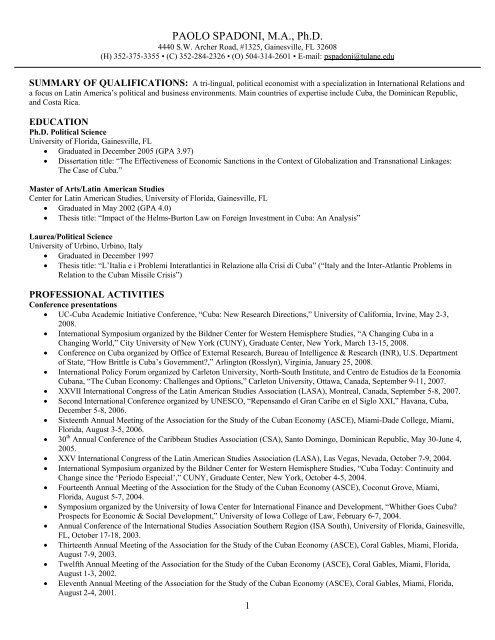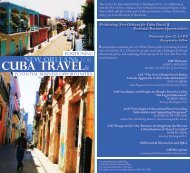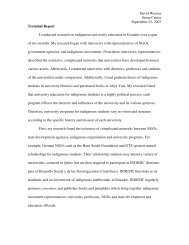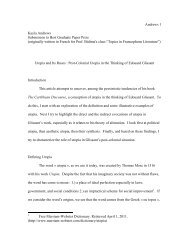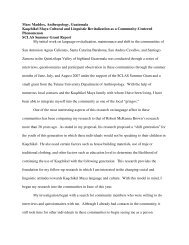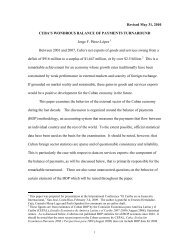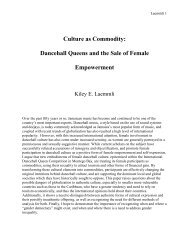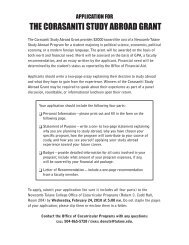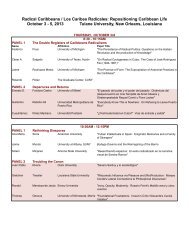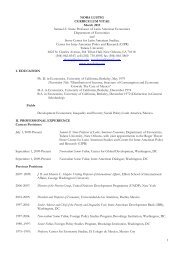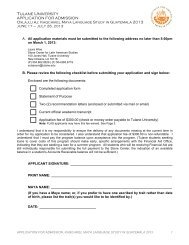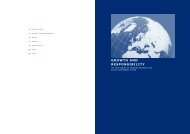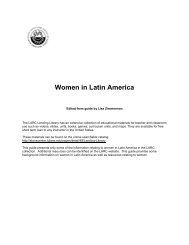Ines Aviles-Spadoni, M - Stone Center for Latin American Studies
Ines Aviles-Spadoni, M - Stone Center for Latin American Studies
Ines Aviles-Spadoni, M - Stone Center for Latin American Studies
Create successful ePaper yourself
Turn your PDF publications into a flip-book with our unique Google optimized e-Paper software.
PAOLO SPADONI, M.A., Ph.D.4440 S.W. Archer Road, #1325, Gainesville, FL 32608(H) 352-375-3355 • (C) 352-284-2326 • (O) 504-314-2601 • E-mail: pspadoni@tulane.eduSUMMARY OF QUALIFICATIONS: A tri-lingual, political economist with a specialization in International Relations anda focus on <strong>Latin</strong> America’s political and business environments. Main countries of expertise include Cuba, the Dominican Republic,and Costa Rica.EDUCATIONPh.D. Political ScienceUniversity of Florida, Gainesville, FL• Graduated in December 2005 (GPA 3.97)• Dissertation title: “The Effectiveness of Economic Sanctions in the Context of Globalization and Transnational Linkages:The Case of Cuba.”Master of Arts/<strong>Latin</strong> <strong>American</strong> <strong>Studies</strong><strong>Center</strong> <strong>for</strong> <strong>Latin</strong> <strong>American</strong> <strong>Studies</strong>, University of Florida, Gainesville, FL• Graduated in May 2002 (GPA 4.0)• Thesis title: “Impact of the Helms-Burton Law on Foreign Investment in Cuba: An Analysis”Laurea/Political ScienceUniversity of Urbino, Urbino, Italy• Graduated in December 1997• Thesis title: “L’Italia e i Problemi Interatlantici in Relazione alla Crisi di Cuba” (“Italy and the Inter-Atlantic Problems inRelation to the Cuban Missile Crisis”)PROFESSIONAL ACTIVITIESConference presentations• UC-Cuba Academic Initiative Conference, “Cuba: New Research Directions,” University of Cali<strong>for</strong>nia, Irvine, May 2-3,2008.• International Symposium organized by the Bildner <strong>Center</strong> <strong>for</strong> Western Hemisphere <strong>Studies</strong>, “A Changing Cuba in aChanging World,” City University of New York (CUNY), Graduate <strong>Center</strong>, New York, March 13-15, 2008.• Conference on Cuba organized by Office of External Research, Bureau of Intelligence & Research (INR), U.S. Departmentof State, “How Brittle is Cuba’s Government?,” Arlington (Rosslyn), Virginia, January 25, 2008.• International Policy Forum organized by Carleton University, North-South Institute, and Centro de Estudios de la EconomiaCubana, “The Cuban Economy: Challenges and Options,” Carleton University, Ottawa, Canada, September 9-11, 2007.• XXVII International Congress of the <strong>Latin</strong> <strong>American</strong> <strong>Studies</strong> Association (LASA), Montreal, Canada, September 5-8, 2007.• Second International Conference organized by UNESCO, “Repensando el Gran Caribe en el Siglo XXI,” Havana, Cuba,December 5-8, 2006.• Sixteenth Annual Meeting of the Association <strong>for</strong> the Study of the Cuban Economy (ASCE), Miami-Dade College, Miami,Florida, August 3-5, 2006.• 30 th Annual Conference of the Caribbean <strong>Studies</strong> Association (CSA), Santo Domingo, Dominican Republic, May 30-June 4,2005.• XXV International Congress of the <strong>Latin</strong> <strong>American</strong> <strong>Studies</strong> Association (LASA), Las Vegas, Nevada, October 7-9, 2004.• International Symposium organized by the Bildner <strong>Center</strong> <strong>for</strong> Western Hemisphere <strong>Studies</strong>, “Cuba Today: Continuity andChange since the ‘Periodo Especial’,” CUNY, Graduate <strong>Center</strong>, New York, October 4-5, 2004.• Fourteenth Annual Meeting of the Association <strong>for</strong> the Study of the Cuban Economy (ASCE), Coconut Grove, Miami,Florida, August 5-7, 2004.• Symposium organized by the University of Iowa <strong>Center</strong> <strong>for</strong> International Finance and Development, “Whither Goes Cuba?Prospects <strong>for</strong> Economic & Social Development,” University of Iowa College of Law, February 6-7, 2004.• Annual Conference of the International <strong>Studies</strong> Association Southern Region (ISA South), University of Florida, Gainesville,FL, October 17-18, 2003.• Thirteenth Annual Meeting of the Association <strong>for</strong> the Study of the Cuban Economy (ASCE), Coral Gables, Miami, Florida,August 7-9, 2003.• Twelfth Annual Meeting of the Association <strong>for</strong> the Study of the Cuban Economy (ASCE), Coral Gables, Miami, Florida,August 1-3, 2002.• Eleventh Annual Meeting of the Association <strong>for</strong> the Study of the Cuban Economy (ASCE), Coral Gables, Miami, Florida,August 2-4, 2001.1
PAOLO SPADONI, M.A., Ph.D.4440 S.W. Archer Road, #1325, Gainesville, FL 32608(H) 352-375-3355 • (C) 352-284-2326 • (O) 504-314-2601 • E-mail: pspadoni@tulane.eduGuest lecturer/panelist• Guest speaker at Rotary Club of Orlando, Orlando, Florida, May 15, 2008• Spring 2008 Symposium, “The Road to the White House: Tough Choices,” Lou Frey Institute of Politics and Government,University of Central Florida, Orlando, March 31, 2008.• Interviewed as an expert on the Cuban economy and US-Cuba relations on Voice of America, August 13, 2007.• Daytona Beach Community College (DBCC), regional <strong>for</strong>um on the subject of “Cuba After Castro – Part II,” panel organizedby DBCC <strong>Center</strong> <strong>for</strong> International Business Education, January 17, 2007.• DBCC Public Broadcasting Channel 15, “Eyes on Education – panel on Cuba,” January 17, 2007.• Orlando, “Doing Business in Cuba,” conference organized by the U.S.-Cuba Trade Association (USCTA), April 13, 2006.• Interviewed as an expert on the Cuban economy on the Voice of America program Ventana a Cuba (Window on Cuba),February 13 and 15, 2006.• Tampa, “Beyond Cigars and Coffee: Cuba’s Investment Opportunities,” panel organized by the Society of InternationalBusiness Fellows (SIBF), February 13, 2006.• Daytona Beach Community College (DBCC), regional <strong>for</strong>um on the subject of “Cuba After Castro,” panel organized byDBCC <strong>Center</strong> <strong>for</strong> International Business Education, January 25, 2006.• Interviewed as an expert on the Cuban economy on the Voice of America program Ventana a Cuba (Window on Cuba),January 5-6, 2006.• Inter-<strong>American</strong> Dialogue (Washington D.C.), “Cuba on the Brink? US Policy After the Powell Commission,” panelorganized by Florida International University's Cuban Research Institute and Inter-<strong>American</strong> Dialogue, November 29, 2005.• University of Florida, <strong>Center</strong> <strong>for</strong> <strong>Latin</strong> <strong>American</strong> <strong>Studies</strong>, course “Political Economy of <strong>Latin</strong> America,” instructor Dr. AnaMargheritis, November 2004.• University of Florida, <strong>Center</strong> <strong>for</strong> <strong>Latin</strong> <strong>American</strong> <strong>Studies</strong>, seminar “Translating <strong>Latin</strong> <strong>American</strong> Literature,” instructor Dr.Elizabeth Lowe, June 2004.• University of Florida, <strong>Center</strong> <strong>for</strong> <strong>Latin</strong> <strong>American</strong> <strong>Studies</strong>, seminar “Continuity and Change in the Cuban Revolution,”instructor Dr. Menno Vellinga, February 2004.• Stetson University, <strong>Latin</strong> <strong>American</strong> <strong>Studies</strong> course, instructor Mary E. Risner, October 2002.• University of Florida, College of Journalism, “A Bridge to Cuba”, panel moderated by Greg Stuart Smith (news director atWUFT-TV), October 2002.PUBLICATIONS• “The U.S. Congress and the Cuban Embargo: Analysis of a Learning Process,” Book chapter in M. Leann Brown, MichaelKenney, and Michael J. Zarkin (eds.), Organizational Learning in the Global Context, Ashgate Publishing, 2006.• “The Current Situation of Foreign Investment in Cuba,” in Cuba in Transition--Volume 14. Association <strong>for</strong> the Study of theCuban Economy (ASCE), 2004, pp.109-131.• “U.S. Financial Flows in the Cuban Economy,” Transnational Law & Contemporary Problems, Volume 14, Number 1,Spring 2004, pp.81-117.• “The Role of the United States in the Cuban Economy,” in Cuba in Transition--Volume 13. Association <strong>for</strong> the Study of theCuban Economy (ASCE), 2003, pp. 410-429.• “Foreign Investment in Cuba: Recent Developments and Role in the Economy,” in Cuba in Transition--Volume 12.Association <strong>for</strong> the Study of the Cuban Economy (ASCE), 2002, pp. 158-178.• “The Impact of the Helms-Burton Legislation on Foreign Investment in Cuba,” in Cuba in Transition--Volume 11,Association <strong>for</strong> the Study of the Cuban Economy (ASCE), 2001, pp. 18-36.• “Cuba’s Current Economic Situation: Macroeconomic Per<strong>for</strong>mance, Structural Changes, and Future Challenges,” Bookchapter accepted on July 30, 2008 <strong>for</strong> inclusion in a University of Cali<strong>for</strong>nia (UC)-Cuba anthology under review byUniversity of Cali<strong>for</strong>nia Press.• Manuscript on U.S. economic sanctions against Cuba (Title TBA) that University Press of Florida (UPF) is considering <strong>for</strong>publication. The book was favorably reviewed by the editor of the Contemporary Cuba Series at UPF. I am currentlyworking on minor revisions be<strong>for</strong>e submitting the final version.• “Foreign Direct Investment in Costa Rica’s High Technology Sectors: Economic Impact and Future Challenges,” article to besubmitted <strong>for</strong> publication in referee journal.• Article on <strong>for</strong>eign direct investment in the Dominican Republic’s free trade zones that will be submitted <strong>for</strong> publication in areferee journal during Spring 2008/Fall 2009.2
PAOLO SPADONI, M.A., Ph.D.4440 S.W. Archer Road, #1325, Gainesville, FL 32608(H) 352-375-3355 • (C) 352-284-2326 • (O) 504-314-2601 • E-mail: pspadoni@tulane.eduOPINION PIECES (op-eds)• “A new No.2 in Cuba?” Orlando Sentinel, January 13, 2008.• “How not to bring liberty to Cuba,” The Christian Science Monitor, November 20, 2007.• “On Cuba, the U.S. is an island,” Los Angeles Times, October 31, 2007.• “Bush deaf about Cuba,” Orlando Sentinel, October 31, 2007.• “Have Cuban donations reached an all-time high?” Orlando Sentinel, October 16, 2007 (also published in Cuba Trade &Investment News, v.9, n.11, November 2007).• “Look beyond Cuban dissidents,” Orlando Sentinel, September 2, 2007 (also published in Cuba Trade & Investment News,V.9, n.9, September 2007).• “All or nothing on Cuba?” Orlando Sentinel, April 1, 2007.• “Cuban economy: The good, the bad, the ugly,” Cuba Trade & Investment News, V.9, n.2, February 2007.• “What Raul’s Cuba might look like,” Orlando Sentinel, December 31, 2006.• “Cuba won’t abandon socialism just yet,” The Christian Science Monitor, November 13, 2006.• “Should Cuban oil be exempted from embargo?” Orlando Sentinel, October 14, 2006 (also published in Cuba Trade &Investment News, V.8, n.11, November 2006).• “In<strong>for</strong>mation blockade to Cuba already broken,” Orlando Sentinel, September 3, 2006 (also published in Cuba Trade&Investment News, v.8, n.9, September 2006.• “Reality in Cuba belies U.S. goals,” Orlando Sentinel, August 14, 2006.• Suppose Fidel is sitting back, watching,” South Florida Sun-Sentinel, August 5, 2006.• “Was it all planned by Castro?” Orlando Sentinel, August 2, 2006.• “Tourism’s challenges: Low spending, high cost,” Cuba Trade & Investment News, v.8, n.6, June 2006.• “Cuba crackdowns are a sign of perceived strength,” Orlando Sentinel, May 14, 2006.• “Family ties could defy Cuba travel rules,” Orlando Sentinel, February 6, 2006.• “Virtues and problems of Cuba’s GDP <strong>for</strong>mula,” Cuba Trade & Investment News, V.8, n.2, February 2006.• “Uphill battle to curb flow of U.S. cash to Cuba,” Orlando Sentinel, November 28, 2005.• “Tracking the Embargo: Restrictions show little effect,” Cuba Trade & Investment News, V.7, n.11, November 2005.• “Truth about Cuba’s economy lies in middle,” Orlando Sentinel, August 29, 2005.• “Rolling back timid capitalist re<strong>for</strong>ms,” South Florida Sun-Sentinel, July 7, 2005.• “Remittances could raise Cubans’ wages, pensions,” Orlando Sentinel, May 22, 2005.• “Making sense of currency changes,” Orlando Sentinel, April 18, 2005.• “Investing in Cuba: Indirect route well-worn,” South Florida Sun-Sentinel, March 14, 2005.• “New export rules on Cuba could backfire in Congress,” Orlando Sentinel, March 7, 2005.• “Foreign banks’ exposure in Cuba unaffected by U.S. pressures,” Orlando Sentinel, February 14, 2005.• “Fewer U.S. visitors, more remittances to Cuba?” Orlando Sentinel, January 17, 2005.• “Don’t change export rules on Cuba,” Orlando Sentinel, December 27, 2004.• “Only small European firms succumb to U.S. embargo on Cuba,” The Gainesville Sun, December 4, 2004.• “Reasons behind Cuba’s dollar ban,” Orlando Sentinel, November 22, 2004.• “Cuba’s war on fake cigars gets unexpected help,” Orlando Sentinel, October 18, 2004.• “Castro’s moves neutralize U.S. measures,” Orlando Sentinel, July 12, 2004.• “Bush steps strengthen Castro regime,” The Washington Times, July 4, 2004.• “U.S. measures strengthen Fidel,” Tampa Tribune, July 2, 2004.• “U.S. policies do not serve national interests,” South Florida Sun-Sentinel, April 5, 2004.• “Adopt 1-track Cuba policy,” Orlando Sentinel, March 1, 2004.• “Miami’s lifeline to Fidel,” (co-authored with Terry L. McCoy), The Christian Science Monitor, September 17, 2003.• “La spada di Damocle sugli investimenti stranieri a Cuba.” <strong>Latin</strong>oamerica e tutti i sud del mondo (Italian magazine), v.82,n.1, 2003.• Paolo <strong>Spadoni</strong> is regularly quoted in major newspapers, news agencies, and magazines. In the past, he was quoted in TheLos Angeles Times, Chicago Tribune, The Christian Science Monitor, The Miami Herald, The Dallas Morning News, SouthFlorida Sun-Sentinel, Reuters, Associated Press, Bloomberg, BBC Mundo, Mother Jones, and several <strong>Latin</strong> <strong>American</strong>newspapers.3
PAOLO SPADONI, M.A., Ph.D.4440 S.W. Archer Road, #1325, Gainesville, FL 32608(H) 352-375-3355 • (C) 352-284-2326 • (O) 504-314-2601 • E-mail: pspadoni@tulane.eduBOOK REVIEWS• Eckstein, Susan. Cubans on the Cusp: Immigrants and Their Impact Across Borders. Manuscript considered <strong>for</strong> publicationby Routledge, reviewed in Summer 2008.• Morris Morley and Chris McGillion, Unfinished Business: America and Cuba after the Cold War, 1989-2001. Cambridge:Cambridge University Press, 2002. Reviewed in Political <strong>Studies</strong> Review, v.1, n.2, April 2003, p.237.PROFESSIONAL EXPERIENCECurrent PositionPost-Doctoral Research Fellow in the <strong>Center</strong> <strong>for</strong> Inter-<strong>American</strong> Policy and Research (CIPR) at Tulane UniversityAugust 2008 – June 2009Conference OrganizationOrganizing Cuba conference scheduled <strong>for</strong> Spring 2009 in San Jose, Costa Rica.Contributor to the Economist Intelligence Unit (EIU)Regular contributor to EIU Country Report Cuba (Economic Policy section)Since November 2007Research Assistant<strong>Center</strong> <strong>for</strong> <strong>Latin</strong> <strong>American</strong> <strong>Studies</strong>, University of Florida, Gainesville, FLAugust 2001 – August 2005• Assisted Dr. Terry L. McCoy with course preparation (graduate business course on the <strong>Latin</strong> <strong>American</strong> BusinessEnvironment and upper level undergraduate course on the International Politics of <strong>Latin</strong> America).• Assisted Dr. Terry McCoy with preparation of annual <strong>Latin</strong> <strong>American</strong> Business Environment Report and The Free TradeArea of the Americas: Opportunities & Challenges <strong>for</strong> Florida and Florida Firms.Teaching experienceVisiting Assistant Professor in the Department of Political Science, Rollins College, Winter Park, FLSpring 2008• Taught four courses, Introduction to International Politics, International Political Economy, Economic Sanctions in Theoryand Practice (two sections), with full responsibility <strong>for</strong> course development and implementation.Visiting Assistant Professor in the Department of Political Science, Rollins College, Winter Park, FLFall 2007• Taught four courses, Introduction to International Politics, <strong>Latin</strong> <strong>American</strong> Trade and Financial Environments, ContemporaryCuba, Cuba in the Post-Cold War Era, with full responsibility <strong>for</strong> course development and implementation.Visiting Assistant Professor in the Department of Political Science, Rollins College, Winter Park, FLSpring 2007• Taught three courses, Introduction to International Politics, Contemporary Inter-<strong>American</strong> Relations, Economic Sanctions inTheory and Practice, with full responsibility <strong>for</strong> course development and implementation.Visiting Assistant Professor in the Department of Political Science, Rollins College, Winter Park, FLFall 2006• Taught three courses, Introduction to International Politics, International Political Economy, Cuba and the United States, withfull responsibility <strong>for</strong> course development and implementation.Visiting Lecturer in the Department of Political Science, Stetson University, DeLand, FLSpring 2006• Taught three courses, Politics of International Trade and Finance (or International Political Economy), Politics of DevelopingWorld (<strong>Latin</strong> America), and Introduction to Contemporary Cuba, with full responsibility <strong>for</strong> course development andimplementation.4
PAOLO SPADONI, M.A., Ph.D.4440 S.W. Archer Road, #1325, Gainesville, FL 32608(H) 352-375-3355 • (C) 352-284-2326 • (O) 504-314-2601 • E-mail: pspadoni@tulane.eduDepartment of Political Science, University of Florida, Gainesville, FLFall 2005• Taught 2 upper level undergraduate courses, International Politics of <strong>Latin</strong> America (INR 4244) and Contemporary Problemsin <strong>Latin</strong> <strong>American</strong> Politics (CPO 4306), with full responsibility <strong>for</strong> course development and implementation.<strong>Center</strong> <strong>for</strong> <strong>Latin</strong> <strong>American</strong> <strong>Studies</strong>, University of Florida, Gainesville, FLSpring 2005• Taught 3 credits upper level undergraduate seminar “Cuba in the Post-Cold War Era” (LAS 4935), with full responsibility <strong>for</strong>course development and implementation.Department of Romance Languages, University of Florida, Gainesville, FLJanuary 2000 – May 2001• Taught 3 times undergraduate course in beginning Italian (ITA 1130), with full responsibility <strong>for</strong> course development andimplementation.Field research• Carried out field research in Cuba every summer between 2000 and 2008.• Carried out field research on the Dominican Republic’s Free Trade Zones during summer 2007 and 2008.• Attended International Trade Fair in Havana, November 1-7, 2004• Attended International Trade Fair in Havana, November 2005AWARDS/RECOGNITIONS/GRANTS• Post-Doctoral research Fellowship in the <strong>Center</strong> <strong>for</strong> Inter-<strong>American</strong> Policy and Research (CIPR) at Tulane University• Critchfield Research Grant to support research in the Dominican Republic, June-July 2007.• Student Teaching Award <strong>for</strong> seminar on Cuba taught in Spring 2005• Travel Award <strong>for</strong> paper presentation at symposium organized by the Bildner <strong>Center</strong> <strong>for</strong> Western Hemisphere <strong>Studies</strong>, “CubaToday: Continuity and Change since the ‘Periodo Especial’,” CUNY, Graduate <strong>Center</strong>, New York, October 4-5, 2004• HIGH PASS in PhD major field comprehensive examination (International Relations), September 2003• Wilgus Field Research Grant to support research in Cuba, May-June 2003• Tinker Foundation Grant to support research in Cuba, May-June 2001SUMMARY OF SKILLS• Deep knowledge of International Relations theories, Cuba’s economy and business market, <strong>for</strong>eign investment in Cuba, andU.S.-Cuba relationship• Solid background in Comparative Politics, Cuba-European Union relationship, <strong>for</strong>eign investment in Costa Rica andDominican Republic, and <strong>Latin</strong> America’s political and business environments.• Fluent in oral and written English, Spanish, and Italian (some knowledge of French).• Exceptional communication, writing, and analytical skills• Excellent professional presentation skills and public speaking skills• Extensive teaching and field research experiences• Multicultural experiences and contacts; easily transcends cultural differences; abundant international experience andextensive travel to <strong>Latin</strong> <strong>American</strong> countries (Cuba, Dominican Republic, Puerto Rico, Jamaica, Costa Rica and Venezuela)5


